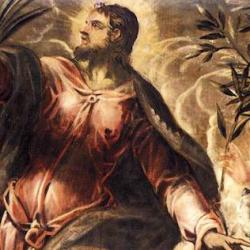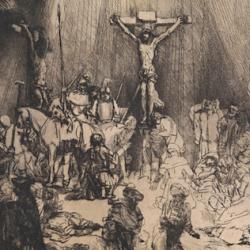Some excerpts from Ivor Davidson’s fine introduction to God of Salvation.
Davidson stresses the intrusive character of the gospel’s God. The story is “profoundly startling, disruptive of natural hypotheses about the conceivable relationship of divinity and finitude, shattering to instinctive assumptions that creaturely life must be immune from personal invasion of such a kind by any being supposed to be the originating agent and sustaining rationale of the cosmos. The story is radical in its sheer intrusiveness, in its unqualified censure of every notion – complacent or despairing – that whatever divinity there be could not do this” (2).
The Spirit’s work of realizing the salvation launched on the cross has a cosmic reach: “As the materiality of the incarnation, resurrection and ascension powerfully establishes, salvation is no deliverance of creatures from the conditions of creatureliness, no release of humans from the restrictions of their worldly environment, no emancipation of the spiritual from the corruptions of the physical. It is the restoration of creation and creatures holistically – human and non-human, physical as well as spiritual – to their intended state. Such restoration is no mere repair job, a contingency measure to patch up a realm that is spoiled. It is the bringing of the world to an even greater blessing than first it knew: the structure of creaturely dignity and communion with God that is represented and effected in Jesus Christ. In the final arrival of the incarnate Saviour – the end for which creation groans – all reality will, in some sense, find itself summed up in him” (3).
And it is a work of God, Father, Son and Spirit: “The God who has need of no society external to the plenitude of his own relational life so loves the world as to enter into union with its dust and atoms; bearing in himself the cost of creaturely alienation, he draws the estranged into the sphere of his eternally perfect communion with himself. The singleness of God’s purpose is of crucial importance here. There is no will or disposition of God the Father that is not shared utterly by God the Son and God the Holy Spirit, no resolution of differences between divine persons, no conflict in the compulsions of love and holiness that are co-essential to God’s inner life. If atonement’s motivation is singular, so too is its execution: each of the persons of the Godhead has a particular role appropriate to his identity, but there is no changing of the attitude of one divine person by another, no conditioning of a wrathful God into a gracious one by inner-divine appeasement, no price of salvation that is not absorbed by all of the divine hypostaseis together” (3).
In expounding this good news, soteriology must constantly resort to its roots, not to repeat what has been said but to undertake “the vastly demanding – and endlessly exciting – task of tracing, again and again, the revealed identity-in-movement of the God who saves.” Theologians must exercise caution to remain within the gospel as they expound it: “If would-be exposition of Christian salvation is controlled by an intellectual scheme whose foundations are foreign to the logic of Scripture, or if the narrative patterns and language of Scripture are set aside in favour of some other idiom – one that is supposedly more sophisticated in conceptual terms, or more accessible to a cultural public for whom argumentation remoto Christo will naturally have greater appeal – there is considerable danger that some being other than the God of the gospel is in fact in view. Associations of Scripture’s God with the putative divinities of metaphysical reasoning are invariably precarious, and Christian investments in general theism have exercised a pernicious influence in all kinds of areas (contributing a very great deal, arguably, to the genesis of modernity’s atheisms)” (5-6).















